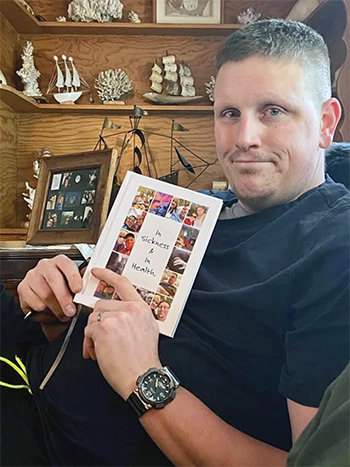Colon Cancer Survivor
Choose positivity

Bryan Wenger knew cancer ran in his family, and he freely admits he should have had genetic testing earlier because it might have saved him from a Stage IIIB colorectal cancer diagnosis at 26. Although treatment was successful, he later developed Stage III prostate cancer and beat it as well. Today, with the support of his wife and family, he remains diligent about follow-up tests.
Multiple people in my family have had cancer, but it wasn’t until a great aunt had genetic testing that we realized Lynch syndrome ran in our family. It had contributed to many members of my family having several types of cancer: stomach, pancreatic, colon, breast, ovarian, endometrial, large bowel, small bowel and kidney. In hindsight, I realize I should have had genetic testing once I turned 18 to confirm whether I had Lynch syndrome. I am now very proactive with preventive scans and tests.
By the time I was 26, I noticed blood in my stools. I asked my doctor for a colonoscopy, fearing the worst, but he was reluctant because it was practically unheard of for someone to have colorectal cancer at 26. After discussing my family medical history, he agreed.
He found a tumor that was about the size of a Nerf football. Part of it was two inches within my rectum and five to six inches outside the rectum. The doctor could not complete the colonoscopy because he couldn’t get past the tumor. After I woke up, he told me I needed to see an oncologist.
Even with Lynch syndrome running in my family, I still didn’t think I would get cancer in my 20s. No one expects that. And most people don’t develop colorectal cancer until they are 50 or older.
The oncologist diagnosed the colorectal cancer as Stage IIIB. At the time, I hadn’t had genetic testing, but the doctor treated me as if I had Lynch syndrome because the odds were good that I did. I had a partial colectomy and a colostomy followed by eight weeks of chemotherapy and radiation therapy. After all of that, I remained free and clear for almost 10 years.
I had colonoscopies every year, but after several years, my insurance didn’t want to pay for them because it was unusual for someone my age to have that many before age 50. This prompted me to bite the bullet and have genetic testing, which confirmed I was positive for Lynch syndrome.
A few years later, my doctor noticed my PSA level rising during my checkups. He grew concerned and ordered a prostate biopsy. I was diagnosed with Stage III prostate cancer that had spread to my seminal vesicles, and I chose to have a radical prostatectomy.
This cancer was particularly aggressive and returned almost immediately after surgery. I requested to have radiation therapy but the doctor was reluctant because I’d already had radiation to my pelvic area for the colorectal cancer. I wouldn’t take “no” for an answer because surgery was no longer an option and I was out of effective treatment options. The doctor finally agreed and, later, I started hormone therapy.
Knowing about Lynch syndrome is a bad news/good news situation. The bad news is that I’m at a higher risk for many other cancers. The good news is that now that I’m aware of it, my doctors and I can be proactive with screenings and monitoring so we can catch future cancers early. We know it’s highly likely I will develop future cancers, but knowledge is power. And, as a result of my testing, more members of my family have had testing, too.
Sharing genetic information with family is so important, and I encourage others to do it especially if cancer runs in your family. When I did the genetic testing, I sent in the results of my mother’s tests along with mine, which provided more information.
Throughout everything, I’ve leaned on my family a lot. It also helps that my wife is a therapist. I needed her counsel especially when the hormone therapy had my emotions swinging from one end to the other. I also found support from Friend for Life Cancer Support Network. Now I volunteer to help others and give back.
After being diagnosed at 26, I wasn’t sure I would see 40. But with good doctors and genetic testing I’m looking forward to seeing 50. A positive attitude is absolutely necessary. I choose to look cancer in the face and say, “I’m going to beat you.”
Bryan's suggestions
- Get genetic testing. If you have several members of your family who have had multiple cancers or developed cancer at a young age, it’s a good idea to determine whether you carry the gene.
- Find a specialist that has experience with your type of cancer and genetic mutations.
- Don’t be afraid to reach out for help. Cancer isn’t something you can do alone.
- You have to have hope.
- Plan to know your limitations with your activities during chemotherapy. It takes a lot out of you, and you can’t do what you normally do while on it.
- Ginger helps with nausea. Try ginger snaps and ginger ale.
- Don’t take “no” for an answer.
- It’s your life and your body. No one can tell you what your quality of life is for you.


